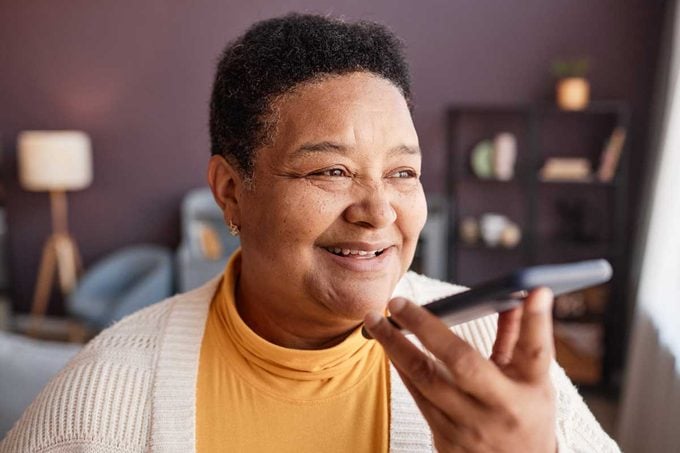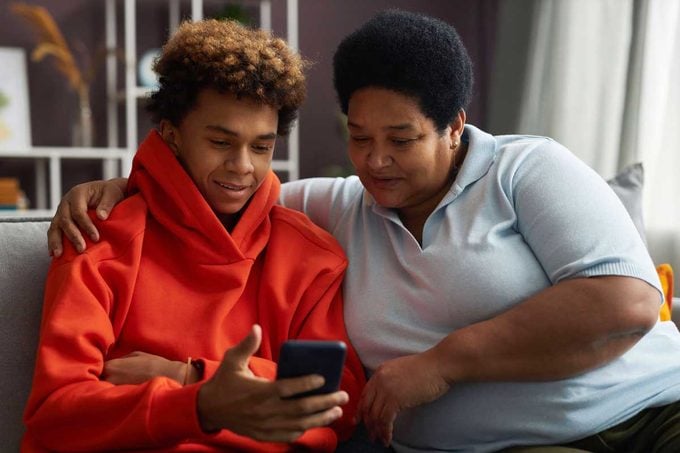The Phone Etiquette Mistake Gen Z Needs You to Stop Making
Updated: Oct. 06, 2023

Are you guilty of this phone faux pas? Here’s what you should be doing instead.
As an adult, I have a very mature and grown-up way of handling my voicemails: I wait until my inbox is full, sigh mournfully, and then hit “select all” and delete. The mournful sigh is the important part, because I want the digital gods to know that I truly am sorry for my immature behavior. I just don’t have the time or the energy to deal with voicemail. But I’m not a monster! When I see that someone has called and left me a voicemail, I’ll call them back to see what’s up. I just don’t listen to their voicemail first; they could be reciting the Gettysburg Address for all I know.
Turns out I’m not the only person who handles voicemail this way—nor am I the worst offender. “Gen Z are digital natives, and as such, they are used to more efficient ways of communication, leading them away from voicemails and phone calls, in favor of texting or FaceTime,” says etiquette expert Diane Gottsman, author of Modern Etiquette for a Better Life. And not only do they tend not to use it, but leaving a voicemail on their phone may cause serious irritation.
“This is one of those things that’s completely changed over the past decade, and the etiquette rules around voicemails have changed too,” Gottsman explains. It’s similar to how many people now see the thumbs-up emoji as passive-aggressive and use IJBOL instead of LOL. We know—it can feel like as soon as you’ve got everything figured out, it changes. But we’ve got you covered. Here’s what you need to know about the latest voicemail etiquette.
Get Reader’s Digest’s Read Up newsletter for more tech, travel, humor, cleaning and fun facts all week long.
Why shouldn’t you leave voicemails?

“It’s really about time, for both parties,” Gottsman explains. For the caller, you have to listen to a long greeting, figure out what to say and get it all in coherently—all before that beep cuts you off. For people listening to the voicemail, it can be even more of a time-suck. “A lot of people ramble during voicemails,” she says, “leaving excessively long or repetitive messages, which then take a long time to sort through.”
The question really is: Why would anyone take the time to leave or listen to a voicemail when we have much faster and more efficient modes of communication? And with texting abbreviations, you can get through an already-brief message even faster.
If you’re wondering about transcription apps that let you read voicemails, it’s not ideal either. (Sorry!) AI transcribes everything, including every “so” and “um,” and it doesn’t always get things right.
What should you do instead of leaving a voicemail?
It may sound counterintuitive, but instead of leaving a voice message, hang up. The cellphone will show the person that you called and when, and that record of your missed call is your message. “People will see the missed call notification, note that you wanted to speak to them and call you back at a time that is convenient for them,” Gottsman says. This is especially true for younger generations, like millennials and Gen Z. However, older generations may worry that a missed call without a message was an accident or that the caller changed their mind. So if using the missed call as your message feels too weird, send a text to follow up.
Texting is usually the way to go if you’re doing the initial reaching out too, because it forces you to be concise. If your message is more complicated, send a text that says, “Hey, I’d love to chat with you about X. When is a good time to call?”
“Texting before calling is the rule of good phone etiquette these days, as it prevents you from waking them up or interrupting them during their work or an important activity,” Gottsman explains. Then, you wait. “If you don’t get a text or call back immediately, assume they are busy, and don’t keep reaching out. Learn to respect the silence.”
When is it OK to leave a voicemail?
When I told a friend about my voicemail-deleting habit, she said, “You must not love your grandma!” Both of my grandmothers have long passed, unfortunately, but I see her point: There are some people whose voices just make you feel better.
The times to leave a voicemail are when the voice is an important part of the communication, Gottsman says—for instance, singing “Happy Birthday,” having a group yell “Congratulations!” or in the case of a serious emergency. “But it better be a real emergency,” she says. “Text or voice-messaging someone repeatedly that it’s an emergency when you’re just trying to figure out what time they’ll be home for dinner is rude.”
The final situation in which you should absolutely leave a voicemail is for people who’ve expressly told you that is what they prefer. Perhaps your loved one really enjoys hearing your voice or your friend has bad eyesight and can’t handle texts. “The gold standard is to ask the other person if they prefer calls, voicemails, or texts and then do that,” Gottsman says.
What else is better than a voicemail, according to Gen Z?

Beyond texting, we have plenty of other ways to communicate with people. And generally, the following options are more appreciated than a long, rambling voicemail.
- FaceTime or video chat: Preferable for people who want to see you and hear you.
- Marco Polo: Asynchronous video messages that work for busy people who still want to video chat.
- Snapchat: Short picture-based messages that disappear after a short amount of time, which makes them perfect for quick, fun messages. (Also, the filters are fun!)
- Social media messaging: Great for communicating about posted life events and may be accessible in areas where regular messaging isn’t.
- Voice-message texting: Good for people who hate typing but the other person prefers to text their response.
How to leave a voicemail the right way
If you decide to leave a voicemail, Gottsman offers these polite tips:
- Be concise.
- Clearly state any important, relevant details.
- Don’t worry about repeating yourself; it’s easy to replay the message.
- Don’t be vague or scary (i.e., “I need to talk to you right now”).
- Respect their silence if they don’t respond immediately.
- Follow up in 24 hours with a text if you haven’t heard back.
Why is voicemail etiquette so important?
Ignorance isn’t a good excuse or good etiquette. It’s true that Gen Z are digital natives, which means much of this is second nature to them, but we can all learn to adapt—and we should. “When your phone updates, look through the new tips and make a note of any that have to do with new features related to calls and texts,” Gottsman suggests. Learning the new etiquette around voicemails and other phone-related scenarios will help you not just be more polite but be a better communicator—with all generations.
About the expert
- Diane Gottsman is a national etiquette expert. She is the founder of The Protocol School of Texas and the author of Modern Etiquette for a Better Life.



